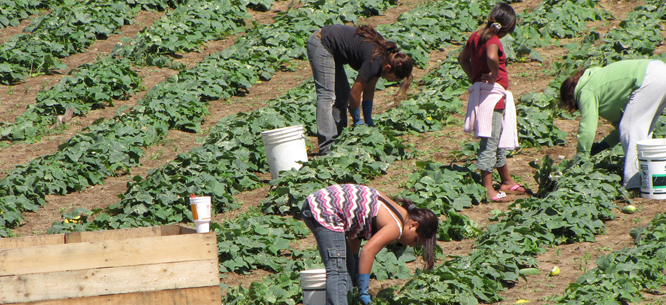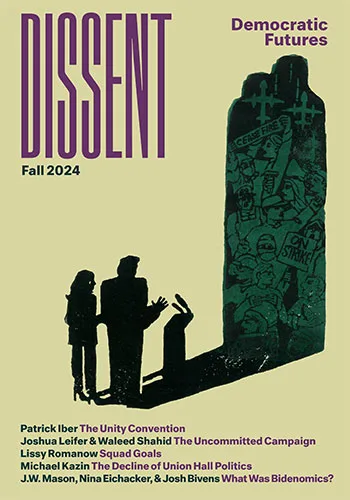Invisible Immigrants: What Will Immigration Reform Mean for Migrant Women?
Invisible Immigrants: What Will Immigration Reform Mean for Migrant Women?

Patricia thought she had crossed the border to a land where she could finally earn a good living. She ended up in one of the worst places to be a woman. As a migrant farmworker, she was brutalized and raped by her supervisor, then left pregnant and alone. Her fear of her abuser was nearly matched by her fear of retaliation if she revealed her secret. She was almost too scared to file a police report, she later recalled in an interview with Human Rights Watch, because “I was afraid they would put me in jail; I was afraid [they’d] send me to Mexico because I was illegal.”
Patricia eventually found her way to a social service agency, which encouraged her to report the rape after she sought assistance for her pregnancy. But countless other migrant women struggle with sexual trauma the same way they endure the everyday brutality of their work: silently.
“One woman told us about how she swam across the Rio Grande to get access to reproductive care.”
One of the most ignored aspects of the debate on immigration reform—which has been largely focused on producing economic growth and legalizing undocumented workers—is what reform will mean for migrant women’s rights. At a time when more American women are asking why they “can’t have it all,” immigrant women endure a much crueler work-life balance: mostly poor, often without papers, and largely Latina, they’re exposed daily to chronic poverty, the threat of deportation, and sexual trauma. The struggle is inscribed on their bodies and reproductive destinies.
In contrast to the stereotype of migrants sponging off of welfare, in some border communities women are driven to look southward as a last resort for reproductive health care. “Immigrant women in Texas tell us that accessing birth control, cervical cancer screenings, and other reproductive care is so difficult here in the United States, they’re forced to cross into Mexico in order to get the care they need,” says Kimberly Inez McGuire, Associate Director of Government Relations and Public Affairs at the National Latina Institute for Reproductive Health. “One woman told us about how she literally swam across the Rio Grande to get access to reproductive care.”
Under federal law, immigrants, including many green-card holders, face various bans and exclusions from federal health programs. For issues of sexual and reproductive health, immigrant women often find themselves doubly excluded from a health care infrastructure that degrades all poor women, unable to access or afford contraceptive and abortion services, prenatal care, or treatment for sexually transmitted diseases. Sexual violence or coercion by employers, inhumane conditions at detention centers, and a lack of legal recourse against abusers plague women with a precarious legal status. The dignity of reproductive sovereignty is a privilege that the low-wage economy forecloses for millions of immigrant women.
Two years ago during the health care debate, conservatives vehemently pressed for the exclusion of undocumented immigrants, turning legal status into a threshold for rationing health care.
According to a policy analysis by the Latina Institute, “the majority of undocumented immigrant women do not have access to affordable health insurance,” and “immigrant women are less likely to receive adequate reproductive health care, including cervical and breast cancer screening and treatment, family planning services, HIV/AIDS testing and treatment, accurate sex education and culturally and linguistically competent services.” Even immigrants with green cards must generally wait five years to qualify for basic Medicaid programs. Some states have expanded coverage beyond federal law for select groups, including undocumented pregnant women and children. But overall, both federal and state health policies pose strict barriers for immigrant women and families.
The image of undocumented immigrants as welfare cheats and public charges all but guarantees that they will be the last group to benefit from any health care expansion. Two years ago during the health care debate, conservatives vehemently pressed for the exclusion of undocumented immigrants from benefits reforms, turning legal status into a threshold for rationing health care.
The Obama administration’s health care reform legislation, the Affordable Care Act, could in theory extend Medicaid access and provide insurance subsidies for more immigrant households with legal status, but the undocumented generally remain excluded from essential federal benefits. And state lawmakers, facing fiscal constraints and conservative backlash against Obamacare, are unlikely to further extend benefits or dismantle existing restrictions imposed on immigrants. Meanwhile, without an overhaul of immigration policy that enables people to legalize and gain full citizenship, their communities’ access to care will continue to be compromised by political and economic disenfranchisement.
Obama’s reforms were “a largely missed opportunity to put right much of what has gone wrong with immigrants’ access to affordable health insurance,” because the expanded benefits for citizens end up being “disproportionately inaccessible to immigrants,” says Kinsey Hasstedt, public policy associate with Guttmacher Institute, a reproductive health advocacy group. According to Guttmacher’s analysis, immigrant women—who are more likely to be poor, young, and of color—are especially at risk of unwanted pregnancy and other reproductive health issues. They are less likely to use contraceptives, with cost barriers posing a major obstacle to preventive reproductive care. Federal Medicaid, moreover, explicitly bars subsidies for abortion services, a provision that disproportionately affects poor women of color.
By perpetuating those racial and economic divides among migrant women, these barriers, Hasstedt told me by email, “make it more difficult for them to realize the broader social and economic benefits linked to women’s ability to determine whether and when to have children, namely educational and professional opportunities and economic and familial stability. These are all crucial considerations for immigrant women’s full and productive integration into U.S. society.”
Gender as Occupational Hazard
Maria lost her motherhood in the fields. As she worked the California harvest last November, the young pregnant farmworker suddenly miscarried. She later recalled in an interview with an advocacy group, “I don’t know what happened. I was working. The doctor told me that I just lost the baby. I don’t know why.” For a poor migrant worker, such tragedies are a regular occupational hazard—and to the agribusinesses that rely on immigrant labor, much of it done by undocumented workers, it’s a rounding error in the cost of doing business.
“I don’t know what happened. I was working. The doctor told me that I just lost the baby. I don’t know why.”
Maria may never understand the reason for her miscarriage, but many potential causes surrounded her at work. Women’s backbreaking toil in the fields, sometimes with their children in tow, exposes them to acute health hazards and threats of violence, aggravated by the underlying malaise of poverty and discrimination.
According to Levy Schroeder, Director of Health & Safety Programs with the Association of Farmworker Opportunity Programs (AFOP), the organization that recorded Maria’s story, in addition to lack of insurance among most farmworkers, many migrants are constrained by “lack of transportation, language barriers, distrust of medical staff, immigration status, and cultural norms that discourage seeking medical care…. Even when a woman does seek medical attention, there are issues with continuity of care and mobility of medical records when the farmworker family moves on to their next workplace, which may be several states away.” All those factors intensify migrant women’s risk of HIV/AIDS, unintended pregnancy, and inadequate prenatal care.
Pregnant farmworkers are also extremely vulnerable to heat-related illnesses. A public outcry erupted in 2008 when a young pregnant migrant died after collapsing from heat exhaustion in a California vineyard. Pesticide exposure is extremely common, which in turn puts women at greater risk of birth defects and other reproductive health problems. But despite some recent state and federal efforts to revamp safety protections, regulations remain anemic, and brutal conditions in the fields persist.
And while all crop workers are subject to exhausting labor and poverty wages, women workers tend to be paid even less than male counterparts.
About eight in ten female workers said they had experienced sexual harassment.
One woman interviewed by AFOP recalled that when she was working in the pumpkin fields during her pregnancy, “I had to bend over all day. I had a lot of [health] problems because the baby was slipping down too far. I [still] worked for two more months, until I was eight months pregnant.”
According to a 2010 study on California farmworkers, about eight in ten female workers said they had experienced sexual harassment, such as degrading comments or groping. Domestic workers have reported similar abuses in private homes. In both sectors, women’s vulnerability is deepened by fear of retaliation for reporting abuse, and a general lack of legal protections that apply to more conventional workplaces.
Body Politic
When immigrant women and reproductive health are mentioned in the same breath in Washington, the discussion often reduces women to pawns in the culture wars.
Conservatives have long propagated the “anchor baby” canard to suggest, without evidence, that women are deliberately using U.S.-born children as a legal shield from immigration authorities. The myth has been used to justify proposals for harsher deportation policies and even repealing the constitutional guarantee of birthright citizenship for babies born on U.S. soil.
Parallel to the accusations of excessive breeding are warnings of excessive terminations of the immigrant “unborn.” Last year, some conservative lawmakers pushed the Prenatal Nondiscrimination Act (PRENDA) as a supposed preemptive strike against sex-selective abortion, based on the presumption that gender-biased mothers were choosing to abort female fetuses (with a clear racial undertone linked to Asian American communities with a tradition of “son preference”). While the bill’s purported goal was “ending discrimination against female babies,” the legislation—which threatened to imprison doctors for performing a sex-selective abortion—was sharply criticized by reproductive rights advocates as another attack on abortion access, under the guise of supposedly “saving” women from their culturally regressive patriarchs.
Whether targeted by sexual violence at work, or cut off from prenatal care, migrant women are by turns exploited and invisible.
Subtler gender bias surrounds the entire political discourse around immigration. The reform proposals currently before Congress—focused on employment-based visas and establishing a tortuous “path to citizenship” that would stretch for over a decade—aim to expand labor migration in male-dominated sectors, namely the high-skilled “STEM” fields (science, technology, engineering, and mathematics). Yet visas for family reunification, which center on family and community rights, would be sharply restricted, taking a back seat to labor-market demands. This would in turn marginalize women and children who typically seek legal status as dependents of male workers.
Whether targeted by sexual violence at work, or cut off from prenatal care, migrant women are by turns exploited and invisible. Though they’re working to raise the next generation of Americans, or to sustain families abroad with money wired home, the law degrades their social value as both workers and caregivers. Falling outside of traditional paradigms of feminism, migrant women confront racial and gender barriers that interlock with capitalist structures of citizenship. Their glass ceiling is the cold edifice undergirding the nation’s economic hierarchy.
Michelle Chen is a contributing editor at In These Times, a contributor to Working In These Times, and an editor at CultureStrike. She is also a co-producer of Asia Pacific Forum on Pacifica’s WBAI. Her work has appeared on Alternet, Colorlines.com, Ms., the Nation, Newsday, and her old zine, cain. Follow her on Twitter at @meeshellchen.




